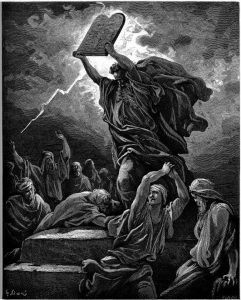Today’s “parasha”{פרשה} (weekly Torah portion) is “Mishpatim” {משפטים} – which is the sixth “parasha” of the Book of Exodus and is found in Exodus 21:1– 24:18.
This “parasha” deals with legal issues and has plenty of laws and rules. The meaning of the Hebrew word “Mishpatim” (the “Parasha’s” name) is laws and that is exactly how it was translated to English:
“These are the laws you are to set before them” (Exodus 21:1)

The root of the Hebrew word “Mishpatim” is “Sh-P-T” {ש-פ-ט} and is the same root as found in the word “Shoftim”{שופטים} – which means judges. Shoftim is also the Hebrew name of the biblical book of Judges.
In Modern Hebrew, the word “Mishpatim” is also used to describe the study of the law (as in the modern law school in university).
One of the more fascinating things about the Hebrew word “Mishpatim” is that this word can also be translated as ‘sentences’ and in this case both Hebrew and English share a ‘hidden’ meaning, because in both languages that word has a grammatical meaning and a legal meaning!
I would like to conclude with a verse from the Book of Zechariah, which decorates the walls of the courts in Israel and strongly connected to our “parashah”:
“These are the things you are to do: Speak the truth to each other, and render true and sound judgment in your courts” (Zechariah 8:16)
